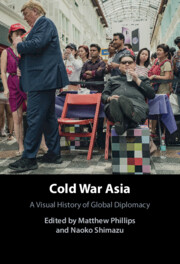
-
Select format
-
- Publisher:
- Cambridge University Press
- Publication date:
- January 2025
- February 2025
- ISBN:
- 9781009379649
- 9781009379618
- Dimensions:
- (229 x 152 mm)
- Weight & Pages:
- 0.51kg, 252 Pages
- Dimensions:
- Weight & Pages:
You may already have access via personal or institutional login
Book description
This innovative, interdisciplinary and international collection of essays offers fresh perspectives on the history of global diplomacy. Experts in history, international relations, art history and performance art have come together to examine a series of visual sources relating to Asia's role in global diplomacy during the Cold War. They explore how leaders, including Indonesia's Sukarno, the Philippines' Imelda Marcos and Thailand's King Bhumibol, exploited the symbolic value of diplomacy to emphasise their agency in relationships with Great Powers. These case studies demonstrate the significance of Asian diplomacy in understanding the Cold War, shifting away from the use of 'war' as the dominant criterion for analysis of the region. Cold War Asia sheds critical light onto how culture shapes international relations, widening the lens of analysis to embed the role of gender, religion, and ethnicity, as well as the material world, into our understanding of diplomacy.
Reviews
‘This volume presents a collection of concise and effective contributions by a diverse group of scholars and practitioners who bring to life symbolic moments and everyday manifestations of diplomacy through refreshing and expansive readings of more and less iconic photographs of the Cold War in Southeast Asia. A key reading for anyone interested in exploring the relationship between images and the politics they represent, project, and keep hidden.’
Chiara Formichi - Cornell University
‘After ploughing through the book, readers will find no overreach to the project’s claim of being 'innovative, interdisciplinary and international'. It is a must-read visual treat for all Cold War scholars worth their salt. The contributors should be proud of this groundbreaking project - a fine example of how historical scholarship can respond to the contemporary, for the world remains ever image-conscious, driven by screens, selfies, and socials.’
Muhammad Suhail Mohamed Yazid Source: Cambridge Review of International Affairs
Contents
Metrics
Altmetric attention score
Full text views
Full text views help Loading metrics...
Loading metrics...
* Views captured on Cambridge Core between #date#. This data will be updated every 24 hours.
Usage data cannot currently be displayed.
Accessibility standard: Unknown
Why this information is here
This section outlines the accessibility features of this content - including support for screen readers, full keyboard navigation and high-contrast display options. This may not be relevant for you.
Accessibility Information
Accessibility compliance for the PDF of this book is currently unknown and may be updated in the future.

